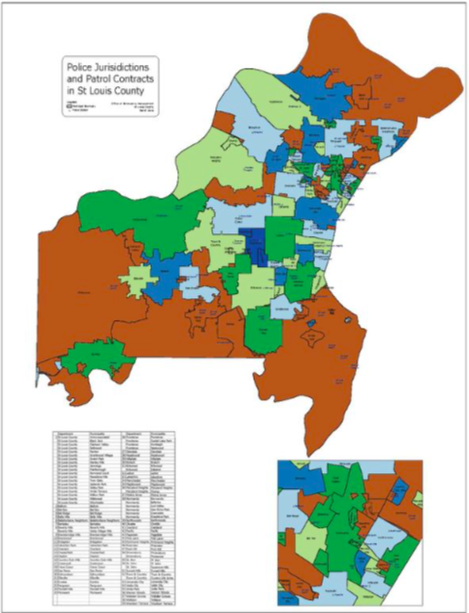Editor’s Note – This piece originally appeared on Mark’s St. Louis City Talk on February 21, 2019
Last week, I broke down my thoughts on this region, from the perspective of a St. Louis citizen, and observer of St. Louis County from the outside looking in.
No plan to address consolidations in this region is going to be perfect. Nothing sums up my initial thoughts more than the following quote:
“You can please some of the people all of the time, you can please all of the people some of the time, but you can’t please all of the people all of the time.” – John Lydgate
The status quo set has plenty to pick apart in defense of the “everything is fine” mentality. For one, estimates on efficiencies in this report are just one set of numbers, from one analysis, by people being paid to “make it so”. Another analysis would certainly be different and yield contrasting results.
So while being critical is healthy, being defeatist is not. It’s worth noting that the haters of this proposal have done NOTHING to date of substance to try and fix the mess that is St. Louis County and St. Louis. They likely have a stake in the status quo.
Again, this proposal is not perfect by any means.
But, I recently had lunch with a civic-minded, intelligent friend the other day who lives in the small town of Maplewood, MO immediately west of St. Louis. He said something that stuck with me: “what if this is our only shot in this lifetime to enact real change for the region?”
He’s for it. The first St. Louis County resident I’ve heard say that. Others are worried about theirs and theirs alone. Never us. Always me. Little we.
I am not going to let perfect be the enemy of good enough when I consider my vote in 2020.
I’ve had a chance to read the report. Now I’ll try to break down some elements of the plan that resonate after a first reading.
The positives:
- This is not some half-assed city joins the county pandering. That “easy path” does nothing to fix the disparities in the region. It just chips away at the bloat and duplication in an area that is bleeding population. The BT report proposes sweeping change that we need. In the words of the report’s key takeaways: “Be bold and transformative – incrementalism does not address the severity of the issues our region faces. As was made plainly clear through the evaluation grids, steps like St. Louis City re-entering St. Louis County as an additional municipality would fail to address critical issues. For example, the City re-entering the County would continue the existence of 55 independent police departments. The Ferguson Commission’s Calls to Action around providing additional training and support to police officers would still require the herculean effort of implementing these reforms one department at a time.”
- The plan calls for one police force. Police were identified as the top service to be evaluated for reorganization by BT. From the report: Based on public input, lessons learned from other regions, and the reports of Better Together, the Ferguson Commission, and the Police Executive Research Forum (PERF), the Task Force recommends consolidating the 55 police departments in the St. Louis region into one professional, accredited police department serving the entire area. Ah, music to my ears. This gets at a lot of the bloat and duplicated spends. We need a single, high-tech, camera/digital forward department with one mission to serve the entire region with professional police services. We’ve long had a race problem within ranks in St. Louis. Would it be easier for minorities to break down barriers in 55 departments or one? I’ll put my money on one.

3. A single tax. We have to quit competing against one another for a retail chain operation, or a budding company expanding and bringing middle-class jobs. The 1% St. Louis earnings tax would be phased out. Believe it or not, that is a real demotivator for people choosing a home or a place to do business. It doesn’t bother me personally because it is such a low impact on the bottom line or budget, and I’m committed to St. Louis. But if I had a choice of more or less taxes, I know exactly which one I would choose. Getting rid of that St. Louis tax that doesn’t hit the other cities in the region is a long-term benefit to St. Louis…the core. This is a tax that separates us. It is a product of the fragmentation and city decline of tax base from population loss and corporate sprawl. I read on a message board at urbanstl.com someone suggest a 1% earnings tax for the entire region. Stick it to Illinois, St. Charles and Jefferson County…not a crazy thought. But, a simple removal of that barrier to St. Louis-living is a plus. A single property tax rate would be huge. This would level the playing field on school funding, etc. This would be another reason to live where you want and not have taxation vary so greatly that it keeps you from one area or another to set up shop. From the report:
“Sales tax for the city which results in a streamlined funding mechanism and, in many cases, a savings for taxpayers. The fact that 3 of the 10 wealthiest municipalities in St. Louis County levy no municipal property tax means these communities are taxing all of the residents of St. Louis to pay the costs of operating small, local governments.”
Further: “Develop a government and tax structure in which all are incentivized to work for the economic growth of the whole, rather than the success of the part at the expense of the whole.”
Word.
4. Statewide vote. This is a blessing and a curse for the BT proposal. First, police powers are regulated by the state government and the only way to comprehensively address issues such as consistent standards for police departments would be through state law. The only way this has a chance to pass is if you open it up to the state electorate. I would guess the city would slightly vote for it, the County would resoundingly vote no and the state…well, I’m not sure, but I think they’d see it as a conservative move to lower taxes, government duplication and an effort to get St. Louis off the most dangerous, murder capital of the free world. A statewide vote is the only chance this region has to improve the current situation.
5. A single city. I’ll cover the goofy moniker of “Metro City” in my negatives post, but we need to think and be one, not “municipal districts” trying to create the separation of haves and have nots. We need to act strongly as a unified city. We need to have a dense, concentrated core around current St. Louis. We need to preserve the suburbs that so many crave in this region. We need both and are more poised to make this together. Creating a government with a strong executive and 33 appointed Metro Council (dumb name again) will make it easier to influence, distribute funds and make the city we want. It is so split up and parochial now, you easily get frustrated. We need to be one St. Louis. We need to think as one.
6. A single municipal court system. Nothing, in my mind, makes this plan better for poor people than this. We need to eradicate the patchwork of small town rules and enforcement. This alone is reason to seriously consider a yes vote in November, 2020. Small towns generating revenue to keep their jobs and provide services for a dying burg with no vision is straight up wrong. It doesn’t work for the common good. This is a no-brainer.
7. A single set of rules to open a business. I’ve long felt that if St. Louis was on an even playing field with the palatable suburbs of Maplewood, Clayton, Richmond Heights, Brentwood, University City, etc., we could compete. Sadly we have a mess of a system and employees incapable of delivering the most basic customer service. If there were one set of rules, there would be less excuses for someone to throw their hands up in the air and just say f it, I’ll do this in U City vs. STL…or vice versa. From the report:
“There are more than 90 ways to license a business in our region. The incredible frustration of trying to determine how to get a business license, and then receiving confusing and often unreliable information from the local authorities, is an all-too-common occurrence in our region. “
Let the urban core compete on an even playing field. It’ll help us, we have the soul.
8. The possibility of an intelligent, legislative and executive body that is paid well and staffed to meet the disparate needs of the region. Professional civic employees! We have a patchwork of qualified people, but sadly others are not and do more harm than good. The cream can rise to the top. Pay them well, elect them, help influence them with your brand of positivity. Less people to talk to and enact the change you desire is a bonus. A good, efficient local government that pays the well enough and is run well enough to retain the good eggs, the courage to weed out the bad eggs and foster a culture that makes being a public servant a career. It’s easier to foster a culture like this in a single, centralized office vs. 89 different ones. Let’s get the best to do the best job.
So there are some immediate pluses that struck me.
We are not growing, and vacancy and neglect will continue to be a problem. It used to be a St. Louis problem, it is now a suburban problem. Look at Wellston, Crestwood, Jennings or Florissant. We need to put our arms around all our aging suburbs and city neighborhoods. We need to focus on the core, we need to stabilize the suburbs.
We need to think about the we not just me.
We need to shake it up. We need to disrupt the nepotism and parochialism. Protectionism. I’m sick of it. I’m getting sick of waiting around for the “talkers” to do something. This BT plan seems a disruptive step in the right direction to make us one big St. Louis with a brighter future.
But it sure ain’t perfect.
Next I’ll hit the negatives of the plan.

